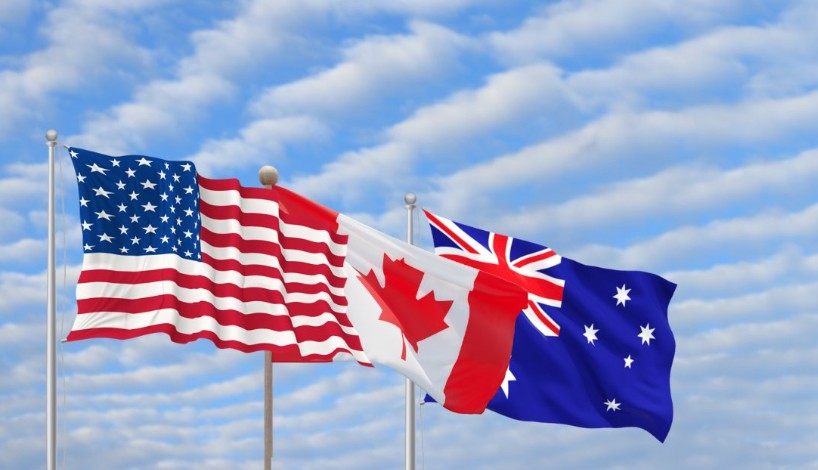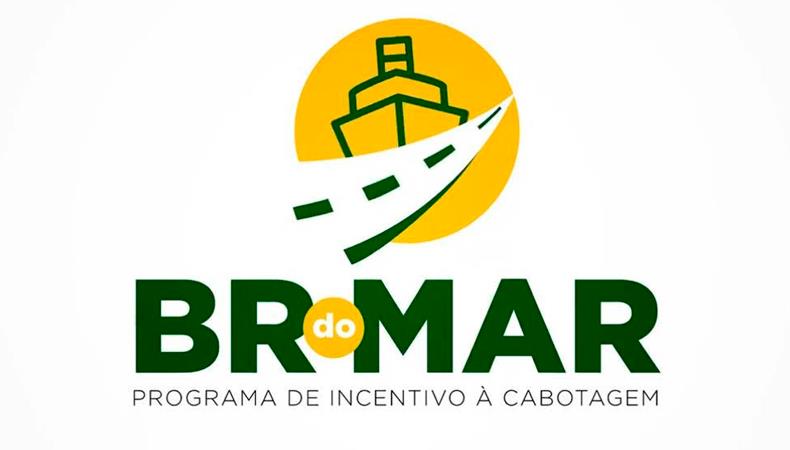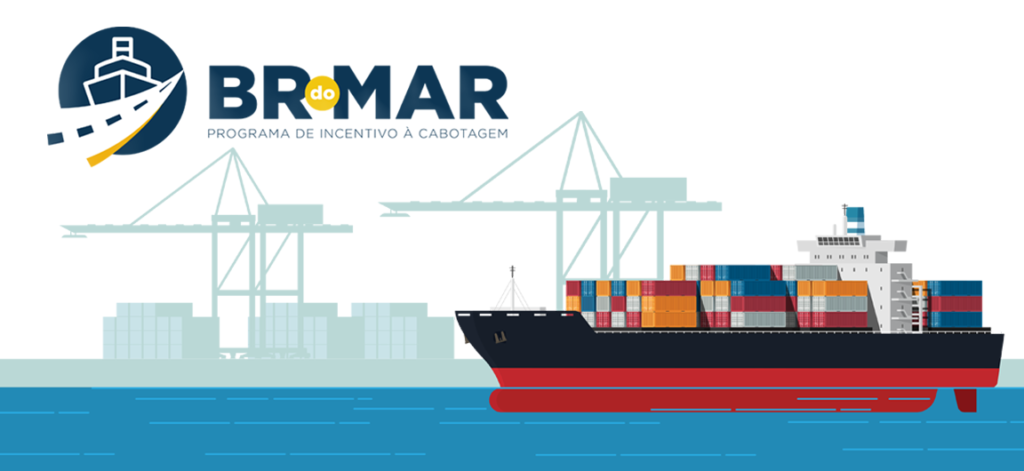
Visa exemptions for certain nationalities rei...
read more

Brazil’s President sanctioned, with vetoes, the stimulus program BR do Bar aimed to foster foreign investments and boost competition in the domestic coastal navigation market
Sanctioning
Following approval, with some amendments, by the Federal Senate, on 7 January 2022, President Jair Bolsonaro sanctioned, with vetoes, Law 14,301/2022, which introduces the Cabotage Transport Stimulus Program, termed by the Executive as “BR do Mar” (roughly translating as ‘federal highway of the sea’).
Law 14,301/2022 also brought significant changes to Law 9,432/1997, which organises Brazil’s waterway transport and regulates cabotage. It also amended correlated legislation to adapt it to the newly enacted regulatory framework.
Objectives
In August 2020, the federal government proposed overhauling the cabotage legal framework through the BR do Mar. The program seeks to foster competitiveness and promote accessibility of this modal to increase the offer of good quality cabotage services, enabling the expansion of the fleet and the development of the domestic naval industry, encouraging national seafaring education, training, and qualification.
Ultimately, the new legislation aims to take advantage of Brazil’s extensive coastline and inland waterways to reduce its heavy dependence on truck transport, today covering more than 60% of the national transport matrix. Cabotage transport is underused, accounting for a mere 11% of all goods moved within the country, excluding oil and its derivatives, with only a dozen players dominating this segment of the shipping market.
The Ministry of Infrastructure expects the volume of containers transported per year to rise from 1.2 million TEUs in to 2 million TEUs by the end of this year. It also forecasts an expansion of the cabotage fleet capacity by 40% in three years.

Qualification of Brazilian shipping companies (EBN)
A Brazilian shipping company (Empresa Brasileira de Navegação – EBN) is a legal entity incorporated under Brazilian Law, headquartered in the country and authorised by the National Waterway Transport Agency (ANTAQ) to provide waterway transport services in Brazilian waters with its owned or chartered fleet. Its capital can be 100% foreign-sourced.
Although the National Congress will discuss the presidential vetoes in the coming weeks – and some of the new rules still depend on specific regulation to be implemented –, the Law has entered into force since its publication. Thus, interested EBNs can now apply to the Minister of Infrastructure to adhere to BR do Mar.
Time chartering
An EBN qualified under the BR do Mar program may charter vessels from its foreign wholly-owned subsidiary or a foreign wholly-owned subsidiary of another EBN to operate in cabotage, provided these vessels are owned by or bareboat chartered to any of these subsidiaries.
BR do Mar provides that time charter may be carried to in the following cases:
Bareboat chartering
Besides expanding time chartering opportunities, BR do Mar allows bareboat charter of foreign vessels, with flag suspension, to operate in the cabotage regardless of a shipbuilding contract in Brazil or an owned Brazilian-flagged ship.
Allowance for bareboat chartered vessels will increase annually: two ships in January 2023; three in 2024; four in January 2025; and, as of January 2026, 48 months down the transition, the number of vessels bareboat chartered will be unlimited; the qualified EBN will be able to operate with chartered ships without the need to have its own vessel or contract the construction of one.
Brazilian Shipping Investment Company (EBN-i)
BR do Mar created the Brazilian Shipping Investment Company (Empresa Brasileira de Investimento na Navegação – EBN-i). The purpose of the EBN-i is to charter vessels to Brazilian or foreign shipping companies eliminating the need for them to invest in an owned fleet.
An EBN-i is entitled to charter foreign-flagged vessels while building a vessel, up to 200% of the shipbuilding deadweight. An EBN-i’s can also transfer, at cost, its tonnage rights from ships under construction to EBNs.
Civil liabilities and hull insurance
Vessels operating in the cabotage trade must be backed by insurance coverage for their hulls, machinery and civil liability.
Before the Waterway Transport Law 9,432/2017 was amended by the BR do Mar, EBNs could buy insurance abroad if the domestic market did not offer similar terms or if the cost was incompatible with the international market. This obligation was removed by Law 14,301/2022, which guarantees the freedom to contract insurance and reinsurance
Minimum Brazilian crewing
According to domestic maritime labour regulations, Brazilian-flagged vessels must carry a captain, chief engineer and 2/3 (two-thirds) of the crew of Brazilian nationality. Foreign vessels trading in cabotage for more than 90 days of continuous operation must employ 1/5 (one-fifth) of native workforce. After 180 days, the fraction must be increased to at least 1/3 (one-third).
The changes to the original text of the BR do Mar proposed that the captain, cabotage master, chief engineer, engine driver and 2/3 (two-thirds) of the crew be Brazilian. However, as explained below, President Bolsonaro vetoed this provision, so the compulsory hiring of native seafarers for cabotage will remain at one-third of the crew.
Foreign seafarers
For immigration purposes, foreign crewmembers embarked on vessels qualified under BR do Mar will be considered embarked on long-haul voyages. Thus, a visa will not be required to disembark in Brazil, provided that the off-signer carries a valid Seafarer Identity Document (SID) issued under ILO Conventions 108-C and 185-C.
Read more about immigration requirements for foreign seafarers and the compulsory hiring of Brazilian crew.
Maritime labour protection
BR do Mar undertakes to comply with international legislation that deals with working conditions, safety and environment on board vessels, as well as the Federal Constitution. It establishes that an agreement or collective bargaining agreement precedes other rules governing maritime labour.
Regardless of the vessel being time chartered, the operation will be carried out by the EBN through a subsidiary established in a country that respects the Maritime Labour Convention of 2006 (MLC 2006) entered into force in Brazil in May of 2021.
Internship program
On the other hand, BR do Mar made it mandatory to open vacancies for internships aboard Brazilian and foreign-flagged vessels for students graduating from professional maritime education. The government will regulate how the internship program will work.
Although the President has barred some of the amendments made by the National Congress during the legislative process, senators and federal deputies can overturn the veto. They have thirty days to deliberate on the issue by voting. An absolute majority of votes from both houses is required to override presidential vetoes. Meanwhile, BR do Mar remains in full force as sanctioned.
The most relevant vetoes were those related to the proposal to renew the Reporto tax incentive program, discontinued since December 2020, reduction of AFRMM freight surcharges, and increase in the proportion of Brazilian crew on vessels employed in cabotage.
AFRMM freight surcharge
The Adicional de Frete para Renovação da Marinha Mercante – AFRMM (Surcharge on Freight for Renewal of the Merchant Fleet) is a variable percentage of the freight rate payable by the cargo owner to the Fundo de Marinha Mercante – FMM (Merchant Navy Fund).
While the original bill sought to optimise the spending of the AFRMM proceeds, revisions made during the discussions by the Legislative Branch intended to reduce the percentages applied to long-haul navigation (from 25% to 8% of the freight), cabotage (10% to 8%) and inland waterway navigation (40% to 8%, keeping the current rate of 40% for the transport of liquid bulk cargoes in rivers and lakes of the North and Northeast regions). The president vetoed the Congress text. He also barred the proposal for allocating one-tenth of the AFRMM resources to finance projects part of the Navy Command’s programs to develop the Brazilian shipbuilding and repair industry.
According to the presidential veto, the proposal to reduce the incidence of AFRMM is unconstitutional as it would entail waiving of revenue without an estimate of the budgetary and financial impact and compensatory measures. Therefore, AFRMM rates remain unchanged at 25% for long-haul navigation, 10% for cabotage and 40% for liquid bulks in the inland waterways of North and Northeast Brazil.
Reporto tax benefits regime
A legislative amendment sought to extend, until December 2023, the tax benefits afforded under the ‘Tax Regime for Incentives for the Modernisation and Expansion of the Port Structure’, known as ‘Reporto’. The Congress text also included dredging companies, bonded storage facilities, and training centres among the regime’s beneficiaries, alongside port operators, concessionaires and lessees of public ports, and companies that exploit port facilities, including the operation of offshore vessels.
To the disappointment of the port sector, the President vetoed the renewal of the tax regime under the same argument used to reject the cut in the percentage of the AFRMM surcharge rates.
Increase in compulsory hiring of Brazilian crewmembers
The President sanctioned mandatory employment of Brazilian master, cabotage master, chief engineer and engine driver on vessels engaged in the cabotage under BR do Mar. However, he rejected the proposed increase in the proportion of native seafarers from one to two-thirds of the crew force. Mr Bolsonaro argued that the proposal is contrary to the public interest and would discourage foreign companies from joining. A greater quantity of Brazilian crewmembers would increase vessels’ manning costs and diminish the attractiveness for many low-cost foreign vessels to participate in the program.
Given the veto, the current mandatory proportion of one-third of Brazilian seafarers on foreign cabotage vessels remains.
Dissatisfaction with vetoes
Despite the generally warm welcome of the new cabotage legal framework, some of the vetoes were met with great frustration. The rejection of the Reporto was particularly disappointing for the port sector, which hoped the revamp of the tax regime would enable ports and backports to adequately equip themselves to cope with the expected rise in demand for cabotage services.
Half a dozen expressive associations of companies in the port and terminal sectors came together to convey their dissatisfaction with the rejection of the return of Reporto. According to a note from a coalition that represents the majority of port operators and private terminals, the end of the program means an increase in taxation that, in some cases, can reach up to 42% of port structure equipment purchases. At the same time, the budgetary impact on maintaining the tax benefit is negligible, estimated at less than 0.01% of the expected collection for 2022. Nonetheless, despite the insignificant effect on the tax budget, the anticipated decline in investment will be drastic and lead to a loss of efficiency in a sector that has invested heavily under the conditions offered since 2004 by the now-defunct Reporto.
Promising prospects
The conversion of the BR do Mar bill into a federal law was widely praised by the maritime community and the port and logistics sectors, despite the vetoes. The move will help in the effort to reduce Brazil’s long-standing systemic dependence on expensive and less efficient road transport, developing the shipbuilding and port construction segments to promote an environmentally-friendly alternative to balance the transport matrix, thus lowering logistic costs and cutting carbon emissions.
Nevertheless, it might take a while until the desired effects of the new legislation come to fruition since many of its provisions require normative acts and regulations before implementation. The eventual review by Congress of the vetoed topics will also influence whether the program will turn out as intended.
Please read our disclaimer.
Related topics:
Rua Barão de Cotegipe, 443 - Sala 610 - 96200-290 - Rio Grande/RS - Brazil
Telephone +55 53 3233 1500
proinde.riogrande@proinde.com.br
Rua Itororó, 3 - 3rd floor
11010-071 - Santos, SP - Brazil
Telephone +55 13 4009 9550
proinde@proinde.com.br
Av. Rio Branco, 45 - sala 2402
20090-003 - Rio de Janeiro, RJ - Brazil
Telephone +55 21 2253 6145
proinde.rio@proinde.com.br
Rua Professor Elpidio Pimentel, 320 sala 401 - 29065-060 – Vitoria, ES – Brazil
Telephone: +55 27 3337 1178
proinde.vitoria@proinde.com.br
Rua Miguel Calmon, 19 - sala 702 - 40015-010 – Salvador, BA – Brazil
Telephone: +55 71 3242 3384
proinde.salvador@proinde.com.br
Av. Visconde de Jequitinhonha, 209 - sala 402 - 51021-190 - Recife, PE - Brazil
Telephone +55 81 3328 6414
proinde.recife@proinde.com.br
Rua Osvaldo Cruz, 01, Sala 1408
60125-150 – Fortaleza-CE – Brazil
Telephone +55 85 3099 4068
proinde.fortaleza@proinde.com.br
Tv. Joaquim Furtado, Quadra 314, Lote 01, Sala 206 - 68447-000 – Barcarena, PA – Brazil
Telephone +55 91 99393 4252
proinde.belem@proinde.com.br
Av. Dr. Theomario Pinto da Costa, 811 - sala 204 - 69050-055 - Manaus, AM - Brazil
Telephone +55 92 3307-0653
proinde.manaus@proinde.com.br
Rua dos Azulões, Sala 111 - Edifício Office Tower - 65075-060 - São Luis, MA - Brazil
Telephone +55 98 99101-2939
proinde.belem@proinde.com.br